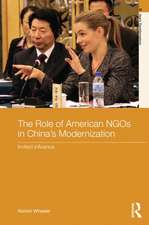NGOs as Legitimate Partners of Corporations: A Political Conceptualization: Issues in Business Ethics, cartea 36
Autor Dorothea Bauren Limba Engleză Paperback – 27 noi 2013
| Toate formatele și edițiile | Preț | Express |
|---|---|---|
| Paperback (1) | 637.13 lei 6-8 săpt. | |
| SPRINGER NETHERLANDS – 27 noi 2013 | 637.13 lei 6-8 săpt. | |
| Hardback (1) | 643.34 lei 6-8 săpt. | |
| SPRINGER NETHERLANDS – 21 aug 2011 | 643.34 lei 6-8 săpt. |
Din seria Issues in Business Ethics
- 17%
 Preț: 364.75 lei
Preț: 364.75 lei -
 Preț: 420.97 lei
Preț: 420.97 lei - 15%
 Preț: 527.48 lei
Preț: 527.48 lei - 15%
 Preț: 644.63 lei
Preț: 644.63 lei -
 Preț: 385.84 lei
Preț: 385.84 lei - 15%
 Preț: 730.86 lei
Preț: 730.86 lei - 20%
 Preț: 517.11 lei
Preț: 517.11 lei - 15%
 Preț: 598.50 lei
Preț: 598.50 lei - 15%
 Preț: 645.60 lei
Preț: 645.60 lei - 18%
 Preț: 1220.88 lei
Preț: 1220.88 lei - 18%
 Preț: 953.03 lei
Preț: 953.03 lei - 15%
 Preț: 643.99 lei
Preț: 643.99 lei - 15%
 Preț: 644.82 lei
Preț: 644.82 lei - 15%
 Preț: 639.73 lei
Preț: 639.73 lei - 15%
 Preț: 635.96 lei
Preț: 635.96 lei - 20%
 Preț: 558.33 lei
Preț: 558.33 lei - 15%
 Preț: 640.55 lei
Preț: 640.55 lei - 15%
 Preț: 644.49 lei
Preț: 644.49 lei - 18%
 Preț: 772.93 lei
Preț: 772.93 lei - 15%
 Preț: 637.59 lei
Preț: 637.59 lei - 15%
 Preț: 643.99 lei
Preț: 643.99 lei - 15%
 Preț: 644.82 lei
Preț: 644.82 lei - 15%
 Preț: 700.61 lei
Preț: 700.61 lei - 5%
 Preț: 1098.27 lei
Preț: 1098.27 lei - 15%
 Preț: 646.43 lei
Preț: 646.43 lei - 15%
 Preț: 643.99 lei
Preț: 643.99 lei - 18%
 Preț: 952.89 lei
Preț: 952.89 lei - 15%
 Preț: 641.38 lei
Preț: 641.38 lei
Preț: 637.13 lei
Preț vechi: 749.56 lei
-15% Nou
Puncte Express: 956
Preț estimativ în valută:
121.93€ • 126.83$ • 100.66£
121.93€ • 126.83$ • 100.66£
Carte tipărită la comandă
Livrare economică 15-29 aprilie
Preluare comenzi: 021 569.72.76
Specificații
ISBN-13: 9789400737587
ISBN-10: 9400737580
Pagini: 228
Ilustrații: XXIV, 204 p.
Dimensiuni: 155 x 235 x 12 mm
Greutate: 0.33 kg
Ediția:2012
Editura: SPRINGER NETHERLANDS
Colecția Springer
Seria Issues in Business Ethics
Locul publicării:Dordrecht, Netherlands
ISBN-10: 9400737580
Pagini: 228
Ilustrații: XXIV, 204 p.
Dimensiuni: 155 x 235 x 12 mm
Greutate: 0.33 kg
Ediția:2012
Editura: SPRINGER NETHERLANDS
Colecția Springer
Seria Issues in Business Ethics
Locul publicării:Dordrecht, Netherlands
Public țintă
ResearchCuprins
Introduction.- The problem.- How do corporations choose their partner NGO?.- Outline and methodology.- Part I Getting to the core.- 1. NGOs as representatives of public claims.- Part II Actors: Civil society and NGOs in the postnational constellation.- 2. The postnational constellation: A broad conception of democracy.- 3. Normative orientation from political theory.- 4. Civil Society: Coming to grips with an elusive term.- 5. Insights from Part II.- Part III Institutions and processes: A normative framework for legitimate partner NGOs.- 6. The public sphere.- 7.Public reason.- 8. The political process.- 9. Legitimacy.- 10. Insights from Part III.- Part IV Drawing a typology for legitimate partner NGOs.- 11. NGOs, interest groups and activists.- 12. Substantive characteristics of legitimate partner NGOs.- 13. Structural characteristics of legitimate partner NGOs.- 14. Procedural characteristics of legitimate partner NGOs.- 15. Insights from Part IV.- 16. Concluding remarks: Normative guidelines for conceptualizing NGOs as legitimate partners of corporations and future implications.- Political-theoretical guidelines.- Rights and duties of legitimate partner NGOs.- Future implications.- Bibliography.- Index.
Textul de pe ultima copertă
The interaction between corporations and non-governmental organizations (NGOs) has become an important topic in the debate about corporate social responsibility (CSR). Yet, unlike the vast majority of academic work on this topic, this book explicitly focuses on clarifying the role of NGOs, not of corporations, in this context. Based on the notion of NGOs as political actors it argues that NGOs suffer from a multiple legitimacy deficit: they are representatives of civil society without being elected; the legitimacy of the claims they raise is often controversial; and there are often doubts regarding the legitimacy of the behaviour they exhibit in putting forward their claims. Set against an extended sphere of political action in the postnational constellation this book argues that the political model of deliberative democracy provides a meaningful conceptualization of NGOs as legitimate partners of corporations and it develops a conceptual framework that specifically allows distinguishing legitimate partner NGOs from two related actor types with whom they share certain characteristics but who differ with respect to their legitimacy. These related actor types are interest groups on the one hand and activists on the other hand. In conclusion it argues that a focus on the behaviour of NGOs is most meaningful for distinguishing them from interest groups and activists.
Caracteristici
First systematic conceptualization of NGOs as partners of corporations Innovative and critical view on the much applauded role of NGOs as partners of corporations First typology to clarify the blurred boundaries between NGOs, interest groups and activists















